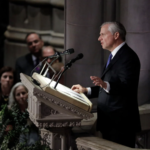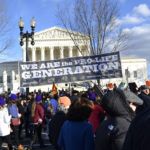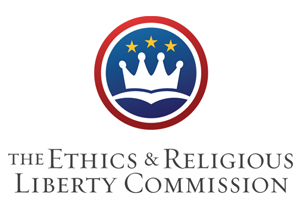
WASHINGTON (BP) — The welfare of women in abortion clinics should be, but isn’t, an issue on which pro-life and pro-choice advocates agree and work together, said members of a Southern Baptist-sponsored panel discussion March 3 on Capitol Hill.
“This ought to be a place where NARAL and NOW ought to be coming to us and saying, ‘How about we just do this together? How about we take a tour of all these clinics across the country?'” Marjorie Dannenfelser said of two leading abortion rights organizations.
“But they are not vested in national common ground,” said Dannenfelser, president of the pro-life Susan B. Antony List. “They are vested in abortion on demand up to the time of birth, and they are so, so tied to that institution.”
Dannenfelser’s remarks came during Capitol Conversations, a periodic, Washington, D.C., panel discussion sponsored by the Ethics & Religious Liberty Commission. The discussion — titled “SCOTUS Takes on Abortion Without Justice Scalia: What to Expect” — took place the day after the U.S. Supreme Court heard oral arguments regarding a Texas law proponents say is designed to protect women’s health by regulating abortion doctors and clinics.
Associate Justice Antonin Scalia — a leading conservative, pro-life voice on the court for nearly three decades -– died in mid-February, leaving only eight justices for the March 2 arguments and the foreseeable future.
ERLC President Russell Moore called it a “sobering reality” that the two sides in the abortion debate cannot find a “point of common ground.” The safety of women “would obviously be, it would seem,” a place for agreement, but the two groups “don’t even have commonality” in that area, he told congressional staffers and others gathered in a Senate office building.
Kim Colby agreed.
“You would think that liberals would want health and safety laws for women,” said Colby, director of the Christian Legal Society’s Center for Law and Religious Freedom. She noted the liberal justices’ apparent skepticism toward Texas’ law during oral arguments before the Supreme Court.
Quoting a previous comment from Dannenfelser, Colby said, “The real question is whether the abortion industry is going to be self-regulating.” Colby added, “That’s what we’re talking about here.”
Scalia’s absence means the court could split 4-4 in the Texas case. If that happens, the Texas law would stay in effect in the jurisdiction of the Fifth U.S. Circuit Court of Appeals, which also includes Louisiana and Mississippi. The Fifth Circuit upheld the law’s requirements that an abortion doctor must have admitting privileges at a nearby hospital in case a woman needs emergency admission and that abortion clinics must meet the health and safety standards of other walk-in surgical centers.
“The dynamic of this case has changed dramatically as a result of Justice Scalia’s death,” said Michael Moses, associate general counsel of the U.S. Conference of Catholic Bishops. “We are in kind of a holding pattern in this case and many others.”
Moses and Barrett Duke, the ERLC’s vice president for public policy, pointed to Associate Justice Anthony Kennedy as the deciding vote — a role he has played frequently for years. Kennedy’s suggestion of a remand as a possibility during oral arguments could mean the case is returned to a lower court, but Moses wondered how the justices would come up with a “governing standard” for the lower court in its reconsideration of the case.
Duke acknowledged Scalia would be missed by pro-lifers and social conservatives.
“God is sovereign. God always does what’s right,” Duke said. “I don’t understand it, but that’s the situation that we’re in at this point.”
Scalia, Moore said, not only was committed to the abiding standard of the U.S. Constitution’s text, “he also understood what constitutional principles do is … protect vulnerable people from majorities.” On abortion, that means protecting “vulnerable women and children from the whims of decisions that are made culturally and the decisions of others.”
Christians must pay attention to the evolving standards of morality and justice in culture and the courts, Moore said.
“That means we should be very concerned when we see on the left an understanding of autonomy that leaves vulnerable people harmed in its wake, and you can see an acceleration of that rhetoric in recent days,” Moore said.
“But at the same time, there are disturbing signs on the right, with a kind of ‘South Park’ conservatism in which no pro-life witness can long be maintained. … A pro-life witness cannot continue in an atmosphere of misogyny. A pro-life witness has to stand up for the vulnerable and has to stand up for the weak and has to stand up for the stability of structures.
“As we go through some very, very tumultuous times, we need to be the people who will say steadfastly regardless of what the political parties do, and even if neither political party will stand with us, that a human being’s worth is not defined in his or her usefulness but in the image of God,” Moore said, “and that no government and no culture has the right to pave over the consciences of anybody and that religious freedom doesn’t come with a majority vote.”
Texas’ law does not violate the “undue burden” test established by the justices in the 1992 Planned Parenthood v. Casey ruling, said Colby, who described its requirements as “reasonable regulations.”
Under the “undue burden” test, she said, “it’s okay if the law makes getting an abortion more difficult. It’s okay if it makes getting an abortion more expensive. It just can’t prohibit abortion. It can’t give the spouse or parents veto power over the abortion. So basically there’s a lot of room in there for the state to regulate. So that’s what Texas did.”
Some of the justices appear willing to return to the pre-Casey standards on abortion, said Colby and Moses.
In another important, abortion-related case this term, the “road got harder” for non-profit organizations that object to the Obama administration’s abortion/contraception mandate, Colby said. March 23 is the date for oral arguments in that case, which involves a requirement that employers provide for their workers not only contraceptives but drugs and devices that can potentially cause abortions.
Colby has not “given up all hope” in that case despite Scalia’s absence, she said. For one thing, the court is concerned about its public image. “The image of nuns and bishops going to jail because they won’t comply is not a pretty one, especially during a presidential election,” she said.
Duke said, “We’re going to need to be praying even harder for the justices to make these decisions, and praying very hard for our leaders to do the right thing when it comes to filling this seat that’s going to be very hard to fill.”
Dannenfelser told the audience, “One thing I’m real sure of, and that is our whole system of government is under a test. [The] responsibility we have to engage in the political process, I think, is more obvious now than at any time I can remember.”
In closing, Jordan Lorence, senior counsel for Alliance Defending Freedom, urged those attending “to persevere and to not lose heart,” citing Galatians 6:9.
“These are the circumstances in the providence of God that have been thrust upon us,” Lorence said. “I think that one of the things that should give us some comfort is that everybody lives their life with an uncertain present.”
The latest Capitol Conversations event -– which was moderated by Steven Harris, the ERLC’s director of advocacy — followed three held in the previous eight months, one on same-sex marriage and religious liberty, one on Planned Parenthood and the sanctity of human life and another on the Syrian refugee crisis.





















